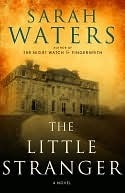More on this book
Community
Kindle Notes & Highlights
And yet, somehow, the essential loveliness of the room stood out, like the handsome bones behind a ravaged face.
BeMandyReads and 10 other people liked this
She might as well, I thought, have been a farmer’s daughter; the more I saw of things at Hundreds, the sorrier I was that her life, like that of her brother, had so much work in it and so few pleasures.
‘There’s a bad thing in this house, that’s what! There’s a bad thing, and he makes wicked things happen!’
We see what a punishing business it is, simply being alive.
For so long as I can keep it, you see, in my room, I can contain the infection. That’s the vital thing now, don’t you agree? To keep the source of the infection away, from my sister and my mother?’
She and Rod have started almost quarrelling, about the farm. Apparently there are new debts. He takes it all so personally! Then he shuts himself away.
Caroline spoke. ‘Rod offered them farmland,’ she said quietly, ‘and they didn’t want it. They’ll only take the grass-snake field, over to the west.
Mrs Ayres and Caroline would be together in the little parlour, reading or sewing or listening to the wireless by the light of candles and oil-lamps. The flames would be weak enough to make them squint, but the room would seem a sort of radiant capsule in comparison with the inkiness all about it.
I suppose I’d grown used to the idea of spending time with her, out in the isolation of Hundreds; and if I’d once or twice had a surge of feeling for her—well, that was one of those things brought on, between men and women, by simple closeness: like matches sparking as they jostled in the box.
‘Oh, women always go on like that. ’ ‘Yes, I’ve often thought it must be exhausting to be a woman. ’ ‘It is, if you do it properly. Which is why I so seldom do.
‘How this house likes to catch us out, doesn’t it? As if it knows all our weaknesses and is testing them, one by one . . .
I keep thinking, too, of what my mother said, when that last set of scribbles was found. She said the house knows all our weaknesses and is testing them, one by one. Roddie’s weakness was the house itself, you see. Mine—well, perhaps mine was Gyp. But Mother’s weakness is Susan. It’s as if, with the scribbles, the footsteps, the voice—it’s as if she’s being teased. As if something’s playing with her. ’
Mother’s very good, you know, at hiding her real feelings. All that generation are; especially the women. ’
‘I just felt ’m, ’ Betty said, more feebly, ‘in the house. He’s like a—a wicked servant. ’
A family man never makes a good family doctor; he has too many worries of his own.
‘We’re talking about hysteria. And hysteria’s altogether stranger—and
Meanwhile, people will go on talking about ghoulies and ghosties and long-leggety beasties, simply missing the point . . . ’
The subliminal mind has many dark, unhappy corners, after all.
Then again, it’s generally women, you know, at the root of this sort of thing. There’s Mrs Ayres, of course, the menopausal mother: that’s a queer time, psychically.
But this house doesn’t want me. I don’t want it. I hate this house!’
My thoughts chased themselves in uneasy circles for a time, then wore themselves out.
The ghost ‘hadn’t wanted her in the house, but it hadn’t wanted her to go, either’. It was ‘a spiteful ghost, and wanted the house all for its own’.
If Hundreds Hall is haunted, however, its ghost doesn’t show itself to me. For I’ll turn, and am disappointed—realising that what I am looking at is only a cracked window-pane, and that the face gazing distortedly from it, baffled and longing, is my own.


